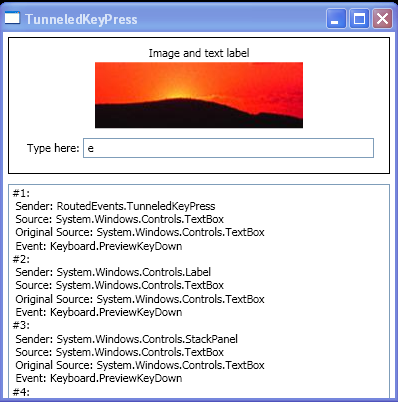Window Preview Key Events

<Window x:Class="RoutedEvents.TunneledKeyPress"
xmlns="http://schemas.microsoft.com/winfx/2006/xaml/presentation"
xmlns:x="http://schemas.microsoft.com/winfx/2006/xaml"
Title="TunneledKeyPress" Height="400" Width="400" PreviewKeyDown="SomeKeyPressed" >
<StackPanel>
<Label Margin="5" BorderBrush="Black" BorderThickness="1" HorizontalContentAlignment="Stretch"
PreviewKeyDown="SomeKeyPressed">
<StackPanel PreviewKeyDown="SomeKeyPressed">
<TextBlock Margin="3" HorizontalAlignment="Center" PreviewKeyDown="SomeKeyPressed">
Image and text label
</TextBlock>
<Image Source="c:\image.jpg" Stretch="None" PreviewKeyDown="SomeKeyPressed"/>
<DockPanel Margin="10" PreviewKeyDown="SomeKeyPressed">
<TextBlock Margin="3" PreviewKeyDown="SomeKeyPressed">Type here:</TextBlock>
<TextBox PreviewKeyDown="SomeKeyPressed" KeyDown="SomeKeyPressed"></TextBox>
</DockPanel>
</StackPanel>
</Label>
<ListBox Margin="5" Name="lstMessages"></ListBox>
<CheckBox Margin="5" Name="chkHandle">Handle first event</CheckBox>
<Button Click="cmdClear_Click" HorizontalAlignment="Right" Margin="5" Padding="3">Clear List</Button>
</StackPanel>
</Window>
//File:Window.xaml.cs
using System;
using System.Collections.Generic;
using System.Text;
using System.Windows;
using System.Windows.Controls;
using System.Windows.Data;
using System.Windows.Documents;
using System.Windows.Input;
using System.Windows.Media;
using System.Windows.Media.Imaging;
using System.Windows.Shapes;
namespace RoutedEvents
{
public partial class TunneledKeyPress : System.Windows.Window
{
public TunneledKeyPress()
{
InitializeComponent();
}
protected int eventCounter = 0;
private void SomeKeyPressed(object sender, RoutedEventArgs e)
{
eventCounter++;
string message = "#" + eventCounter.ToString() + ":\r\n" +
" Sender: " + sender.ToString() + "\r\n" +
" Source: " + e.Source + "\r\n" +
" Original Source: " + e.OriginalSource + "\r\n" +
" Event: " + e.RoutedEvent;
lstMessages.Items.Add(message);
e.Handled = (bool)chkHandle.IsChecked;
}
private void cmdClear_Click(object sender, RoutedEventArgs e)
{
eventCounter = 0;
lstMessages.Items.Clear();
}
}
}
Related examples in the same category